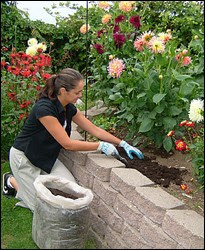 Hours spent in the garden pay off with more than baskets of blooms. A recent American study found that garden work can ward off osteoporosis. In a survey of 3310 women ages 50 and over, gardening -- pushing a mower, pulling weeds, lifting bags of fertilizer - was the most popular pastime and the activity most closely linked to healthy bones. "People ask me, 'What's the best exercise for bone health?'" says Lori Turner, the health-science professor who led the study. "I say, the one you'll do. People like gardening."
» Continue reading
Hours spent in the garden pay off with more than baskets of blooms. A recent American study found that garden work can ward off osteoporosis. In a survey of 3310 women ages 50 and over, gardening -- pushing a mower, pulling weeds, lifting bags of fertilizer - was the most popular pastime and the activity most closely linked to healthy bones. "People ask me, 'What's the best exercise for bone health?'" says Lori Turner, the health-science professor who led the study. "I say, the one you'll do. People like gardening."
» Continue reading
Read more on Health

 Feel guilty about the Everest like mounds of paper on your desk? Don't. They're an essential part of the human thought process, according to one research team. In a series of studies across many occupations, social scientists Abigail Sellen and Richard Harper, co-authors of The Myth of the Paperless Office, observed that when people read at work, they use annotating, cross-referencing and paper-sorting to tackle complex problems.
Feel guilty about the Everest like mounds of paper on your desk? Don't. They're an essential part of the human thought process, according to one research team. In a series of studies across many occupations, social scientists Abigail Sellen and Richard Harper, co-authors of The Myth of the Paperless Office, observed that when people read at work, they use annotating, cross-referencing and paper-sorting to tackle complex problems.